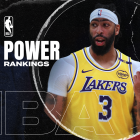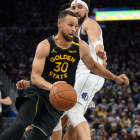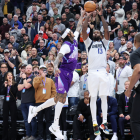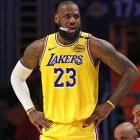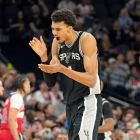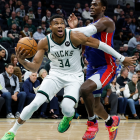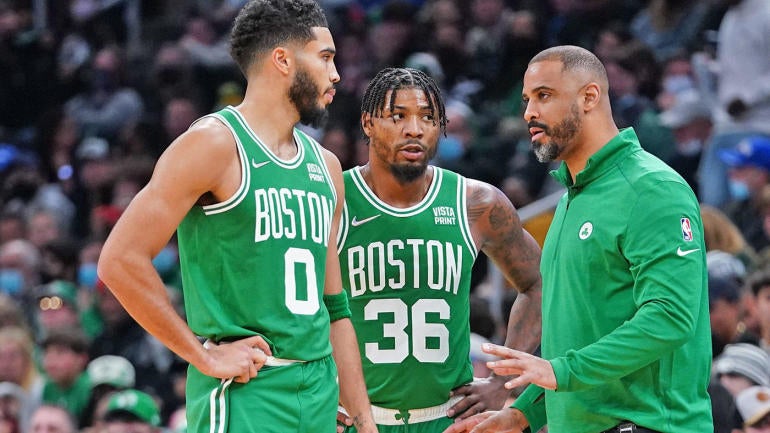
There may still be hope for the Boston Celtics. But their best chance to claim another banner sits firmly in the past.
Sure, yes, of course -- Boston can technically still win this series if they hold homecourt in Game 6 Thursday night and then go back to San Francisco and then post a W on the Warriors' home floor Sunday night in Game 7.
However they find themselves on the brink of elimination because they have betrayed the surge of resilience and star-squashing defense that got them here. Shutting down, and pushing past, Kevin Durant, Giannis Antetokounmpo and Jimmy Butler are impressive victories. Dealing with Steph Curry -- and the real, brutal, rare, surprising effect of trying to win an NBA title -- is something else entirely.
Call it pressure. Call it fear. Call it the moment that separates the talented from the winners, the professionals from the champions. Whatever it is, it beat the Celtics the last two games as much as Curry & Co. did.
Especially in Game 4, when the Warriors offered a win to the Celtics on a silver platter. Jayson Tatum, Jaylen Brown and their teammates simply couldn't take it.
Like in Game 4, the Celtics entered the fourth quarter of Game 5 down a single point after a back-and-forth, hard-fought contest. Unlike in Game 4, though, Curry didn't rise up to single-handedly beat them. They did that to themselves just fine.
In Game 4, Boston was bearing down on a 3-1 series lead and all that likely meant. Then Curry happened, and on the other side of a 17-3 Warriors run to close out that game we sat at 2-2. Fine. Series still very much on. The thing about going against GOATs means you're likely going to have to deal with those big performances; the key is how to weather the storm. But the failure in Game 5 came with Curry decidedly mortal: 16 points, an 0-for-9 night from the 3-point line, and no fourth quarter heroics.
Curry may have beat them a few days earlier, but this was just the Celtics, again, nervous, jittery, and unsure, beating themselves. They coughed up four fourth-quarter turnovers. They shot 27 percent from the field and a putrid 25 percent from behind the arc. Tatum and Brown combined to go 2-of-9 from the field. They broke.
To win the next two games, they'll have to do a lot more than overcome the Warriors and its all-time great star. The Celtics will have to overcome something in themselves that has turned the NBA's best team into a shell of themselves come the fourth quarter in their last two outings.
And their failings have come against a different kind of Warriors team compared to the ones that have competed for, and won, NBA championships in the past -- a lesser one.
There's no Kevin Durant to bail out the Warriors on a Curry off-night. Klay Thompson has vacillated between mediocre and fine, Draymond Green between awful and so-so. Jordan Poole has for long stretches turned back into what looks a lot like a G-leaguer. Andrew Wiggins has been excellent, sure, but if you can't beat a team in the NBA Finals on a night in which Wiggins is its best player, you're probably in big trouble.
Curry is Curry, yes, aside from uncharacteristically off night he had Monday. But Curry historically responds to bad games in the playoffs with efficient nights of dominant, glorious offense.
"Now, that's good for us," Green said after the game, having seen this story before. "He was 0-for-9 from 3. He's going to be livid going into Game 6, and that's exactly what we need."
There are lots of Xs and Os you can study, plenty of numbers that can tell the tale of large sample sizes and statistical realities of both these teams. There are the game plans Boston can, and should, draw up to replicate what they have done well for long stretches of a series they should be winning, and so on.
But as two-time NBA champion Isiah Thomas told me, all that stuff goes out the window when the pressure is turned all the way up to maximum. "The pressure is real," he said. "Some players, some great players, can handle it. Some can't."
But the real answer to how Boston wins this thing is simple and twofold: Don't let Curry beat you, and don't beat yourself.
On the first one: Good luck. Curry, as I've written, is likely going to end his career as a Top-5 all-time player, an all-time talent too often underappreciated, earning the dues he deserves long after the fact. But he's the best player on the floor in this series, he's shown he can single-handedly win a game if he must, and in Game 5 his teammates started to offer the kind of help he could have used all along. Curry, as Green said, is going to be livid Thursday night, and he's going to be dangerous.
But the second point addresses why this series feels finished: No team can win a championship if the closer they get to it, the quicker they fade. And the Celtics have been a bundle of nerves and worry and poor play in the moments in which a ring has been at its closes -- turning the ball over, playing hot potato, lacking a star willing to seize the moment.
Tatum has been off much of this series. Brown has had several lackluster second halves. Marcus Smart has not filled that void. And you can only ask Al Horford and Derrick White to save the day in a fourth quarter of an NBA Finals once -- and once feels like one time too many.
The Celtics have a chance Thursday night, and as head coach Ime Udoka pointed out, they were in this exact position, down 3-2 and facing elimination, earlier this postseason against last year's champs, the Milwaukee Bucks.
But playoffs basketball is about adjustments, and the one Boston needs to make is the one we haven't seen them make yet: The ability to seize a series, under the most intense sensation of hope and fear, when something as rare as a championship presents itself.
We've seen enough to know that Steph Curry can. Meanwhile, the Boston Celtics are still trying to grasp just how to match him when it matters most.










